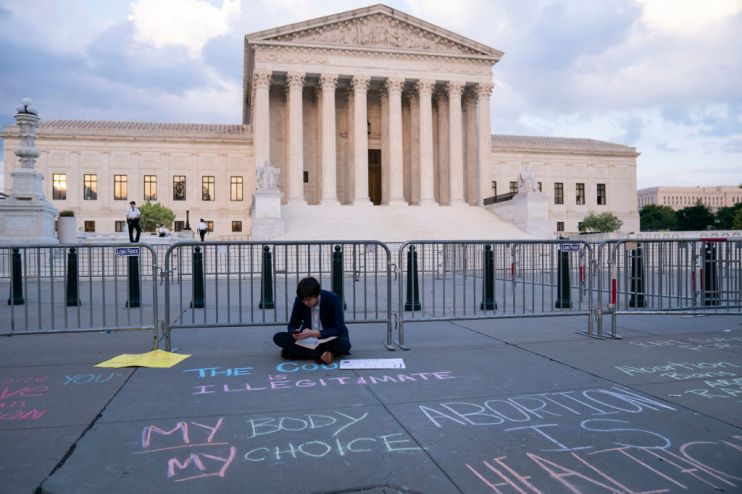America’s Roe v Wade reckoning could be ours too if we don’t defend choice

In America, the right to choose – to keep or end a pregnancy – is under threat. On Monday night, a leaked opinion from the US Supreme Court showed the judges were prepared to strike down its famous Roe v Wade ruling, in opposition to the 69 per cent of Americans who want it to stand.
Handed down in 1973, Roe determined that the US constitution protects the right to an abortion without excessive government intervention, effectively repealing state laws that made it illegal and becoming the foundation of reproductive rights for Americans. Roe has been the subject of attack – religious, political and rhetorical – ever since, and now faces a legal challenge as Mississippi seeks to have it overturned.
The draft has been greeted with jubilation as well as horror. While some devastated Americans told stories of the backstreet abortions their grandmothers survived (or didn’t) and wonder whether ectopic pregnancy will become a death sentence again, others are popping open the champagne. Thirteen states have already passed “trigger laws” which will automatically ban abortion should Roe be overturned, meaning around 36 million women of reproductive age who live in those states will lose their legal access to abortion overnight.
Brits may shiver to learn that so fundamental a right can be stripped away with such terrible speed, Handmaid’s Tale-like in its misogyny and cruelty.
It could never happen here, we say to ourselves.
It is true that in Britain, this particular aspect of reproductive rights was resoundingly settled in 1967 by the Abortion Act. But here too has a woman’s right to choose in matters of her body and reproduction been recently menaced.
It was only in February this year that the government announced the ending of pandemic-era measures that had removed unnecessary hoops to accessing early abortion – including a prohibition on virtual consultations and the requirement of two doctors’ approval – in order to facilitate at-home abortion services. These pragmatic changes increased both the dignity and convenience of early abortion and though particularly important during the pandemic, they had already been introduced in Scotland in 2017.
It wasn’t the 89 per cent of women who accessed at-home early abortion service and said they would opt for it again over an in-person visit that would save the reforms. Nor was it the support of authoritative organisations, including the National Institution for Health and Care Excellence and the Royal College of Obstetricians and Gynaecologists.
Instead, the government was forced into it when MPs from across the House – including former Tory ministers Caroline Nokes MP, Sir Peter Bottomley MP and Crispin Blunt MP – voted to do so via an amendment to the Health and Social Care Bill. In doing so, they served as the voice of the 150,000 women who made use of the reforms during the pandemic.
But this year has also seen the publication of the Ockenden Review into the maternity care failings of the Shrewsbury and Telford NHS Trust, detailing the silencing and disregard of women who were, in some cases, blamed for their own deaths. The Review exposed the lethal prioritisation of “natural births” over caesarean sections, part of a catalogue of error and neglect that may have led to the deaths of over 200 babies.
In the scandal’s wake, women have spoken up about their experiences of having choice taken away from them by medical professionals and pressured into “natural births”.
Whether women have the right to make these choices, from ending a pregnancy to opting for a caesarean birth – and whether we listen to their answers – is a vital test of the extent to which a nation fully recognises their humanity.
As America teeters on the edge of becoming blind to that humanity, despite nearly fifty years of legal access to abortion, we in the UK must learn the bitter lesson of vigilance.